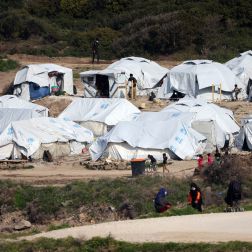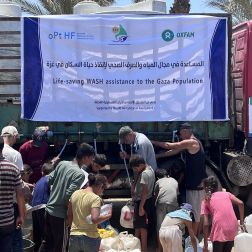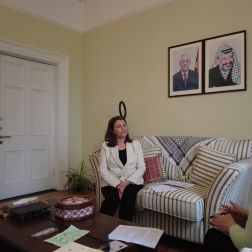- 6 mins read time
- Published: 23rd October 2014
Hunger and conflict pushing South Sudan to the brink of famine
As humanitarian crises in the Middle East dominate news headlines and the world rallies to tackle the ebola outbreak, hunger and conflict have combined to push South Sudan – the world’s newest country – to the very brink of famine.
The recent Scottish referendum is a stark reminder that even in times of peace and democracy, the path to independence can divide a nation. In Ireland, we know too well the enduring struggles the journey towards independence can bring.
South Sudan became the newest country in the world in 2011 following two decades of civil war in what was then part of Sudan. A green country not unlike our own where the River Nile flows, independence brought optimism for a brighter future.

But the high hopes of just three years ago now lie in tatters. At least 10,000 people have lost their lives and over one million have fled their homes. Around four million people (more than the population of Leinster and Munster combined) are struggling to find enough to eat.
In a report titled ‘From Crisis to Catastrophe’, Oxfam Ireland and other aid agencies including Christian Aid, Concern, Goal, Trócaire, Tearfund and World Vision have warned that the number of people facing dangerous levels of hunger is expected to increase by 1 million between January and March next year.
They are not the victims of nature, but of a disaster which is the result of a political dispute between two leaders that has escalated into a conflict rooted in the unresolved tensions of the Sudan civil war combined with the proliferation of arms and the lack of development in what is one of the poorest countries in the world.
There are fears among those working on the ground that efforts so far this year to prevent the crisis from deteriorating will falter as rival sides are regrouping ready to resume violence once the rainy seasons end this month. The threat of famine is very real.
Despite this, the sheer number and scale of crises worldwide – Iraq, Syria, Gaza, Ukraine, the Central African Republic and now the ebola virus among them – means the rapidly deteriorating situation in South Sudan has slipped off the news agenda.
The UN has declared South Sudan the world’s worst food crisis. But if we wait for an official declaration of famine to put South Sudan in the global spotlight, it will be too late. By the time famine was declared in Somalia and the Horn of Africa in July 2011, more than 125,000 people, half of the famine’s victims, had already died.
Since the violence broke out in December, men, women and children have been targeted because of their ethnicity and many have lost the people they love most in the world. They are scared and hungry.
Many have had to leave behind their possessions, crops and livestock or sell their assets to escape and have no means to buy food, water and other essentials. The conflict has meant that people were not able to plant crops. Camps are becoming overcrowded and poor sanitation is increasing the risk of disease.
Gwada Joseph (27) walks through open sewers in the Malakal camp for internally displaced people in the Upper Nile province, where heavy rains are making life intolerable for civilians. Gwada fled her home in Malakal town during the second rebel attack on her town in February 2014. Her husband was unable to escape and died in the fighting, while Gwada, her mother and four children made it to the safety of the UN camp.

Above: Gwada Joseph, 27, with son Mark, 1, in the Malakal IDP camp, South Sudan, where recent rains are making life intolerable for civilians. Photo: Simon Rawles/ Oxfam
Her home in the camp routinely floods in the rains, making life unbearable for her and her children. The rains in Malakal mean flooding is a regular occurrence and it is common to see people having to wade through water and mud that’s knee deep with little escape from mosquitoes, sewage and disease.
International aid – including Ireland’s contribution – has had a significant and positive impact on Gwada and her people’s lives. Food distributions make the difference in people eating even one meal a day and clean water has prevented more serious outbreaks of disease, while the distribution of solar lamps is helping keep girls and women safe.
Yet a massive funding gap remains (the UN World Food Programme estimates that $78 million is needed each month to deliver assistance) and the outlook for 2015 is of great concern, with news that 2.5 million people are projected to be in crisis or emergency from January to March 2015.
Sadly, this is not a crisis that will be ended simply with more aid. There needs to be political pressure to end this conflict. If the international community really wants to avert a famine then it must take a stronger stance towards the leaders of South Sudan increasing diplomatic efforts to end the fighting.
The UN Security Council must impose an embargo on the arms and ammunition that are sustaining the conflict and ensure that it is rigorously enforced. Every political negotiation should focus on the most important priorities; overcoming the obstacles that South Sudan’s people face in reaching aid; ending the violence immediately; and searching for a sustainable political solution.
The world must protect South Sudan’s people from violence; without ending the violence, the threat of famine will never be far away. With more vigorous diplomacy and swift action to convene a political solution inclusive of all people in South Sudan, the world has a chance to prevent that.
Otherwise 50,000 children will die from malnutrition unless we wake the world up and act now.
Because declaring a famine is like declaring a car crash – once it happens, it’s too late.




